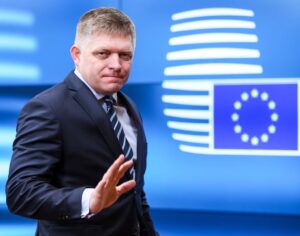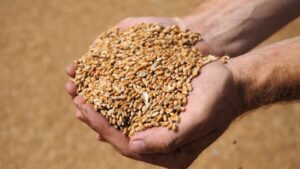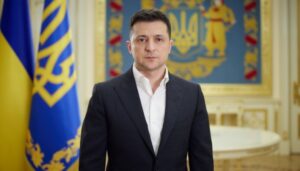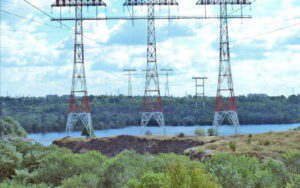
The opposition Social Democratic Party “Course – New Democracy” of former Prime Minister Robert Fico has won the parliamentary elections in Slovakia held on Saturday, the republic’s statistics office said.
According to data from 95.75% of polling stations, it gained 23.58% of the vote, while the liberal Progressive Slovakia party, led by Vice President of the European Parliament Michal Šimečka, received 16.37%.
As noted in exit polls, the far-right has apparently managed to overcome the five percent threshold, and will now be represented in the Slovak parliament.
Fico is known as a politician who opposes the continuation of arms supplies to Ukraine. He also claimed that the West’s anti-Russian sanctions are ineffective and promised to use his veto over Ukraine’s NATO membership application. Shimechka is his opposite, holding liberal and pro-Western views and promising voters to deepen European cooperation, The Guardian notes.

Ukraine will file a lawsuit with the World Trade Organization (WTO) against Poland, Hungary and Slovakia over their refusal to lift the ban on Ukrainian agricultural products, Taras Kachka, Deputy Minister of Economy and Trade and Ukraine’s trade representative, told Politico.
“It is important to prove that these actions are legally unlawful. That’s why tomorrow we will start the court proceedings,” Kachka said last Sunday, adding that Kyiv is preparing to take retaliatory measures against Polish fruit and vegetable exports.
Commenting on the introduction of unilateral bans by Poland, Hungary and Slovakia on Ukrainian grain after the European Commission’s decision to lift the restrictions, Kachka said that “in our opinion, these measures by Hungary and Poland are a statement of total distrust of the European Commission.”
Ukraine’s trade representative believes that the open defiance of Brussels by Poland, Hungary and Slovakia was not just an internal EU matter, but caused what he called “the biggest systemic problem” – whether international trading partners can trust what Brussels says on behalf of the EU.
“For many years, the European Commission has been the mediator in trade negotiations and the trade policy institution for the entire EU. And we are used to working on this basis,” Kachka said, adding that, in his opinion, “the systematic approach of Budapest and Warsaw to ignore the position of the EU institutions in trade policy will be a problem for the EU as a whole, because there is no unity here.”
Kyiv plans to sue the three countries at the World Trade Organization rather than through its own trade agreement with the EU. “I think the whole world needs to see how EU member states behave toward their trading partners and their Union, because it can affect other states,” he emphasized.
While Slovakia simply extended the EU’s previous ban on four types of grain, Poland over the weekend introduced additional bans on Ukrainian flour and feed. Hungary, according to Kaczka, is going even further and banning 25 more products that were not previously discussed, including meat.
“These arbitrary bans are ridiculous. I think that Hungary is making a political statement here that it wants to block trade with Ukraine and completely ignore Brussels. And that’s why I think this is a very bold move against both of us by Budapest,” Kachka emphasized.
While Hungary’s additional bans are mostly symbolic, given that Ukraine does not export much beef and pork to the country, Poland’s measures will affect a significant portion of Ukraine’s exports, Kachka said. If Warsaw does not lift these additional bans, “we will be forced to take measures in response to additional products and ban imports of fruits and vegetables from Poland.”
The governments in Budapest and Warsaw have said they are acting to protect their farmers from a surge of Ukrainian produce that has led to lower prices, but Kaczka denied that reasoning is flawed: “The Polish ban will not help farmers, it will not affect prices because prices are global – what they do is based on public opinion.”
An EU official told the publication that Brussels hopes to solve this problem by forcing Kyiv to impose its own export restrictions in the event of a sudden surge in exports.
When asked about this potential agreement, Kachka said that Kyiv is ready to “take responsibility for ensuring that exports from Ukraine do not cause a tsunami in neighboring countries” and will introduce a system of “real-time” grain export licenses for both countries, which will slow down exports to neighboring countries and allow Ukraine to “react quickly” if a surge is detected.
As reported, the ban on the export of wheat, barley, rapeseed and sunflower seeds from Ukraine to Poland, Hungary, Slovakia, Romania and Bulgaria, introduced on May 2 for the period until June 5, was extended until September 15.
On Friday, September 15, the EU allowed the ban to be lifted after Ukraine promised to take measures to tighten export controls to neighboring countries. On the same day, Poland, Hungary, and Slovakia imposed unilateral bans on imports of Ukrainian agricultural products. In addition to wheat, rapeseed, sunflower, and corn, Poland banned imports of cereals and flour, while Hungary expanded the list to 25 items.

The Slovak government has decided to extend the ban on imports of wheat, corn, rapeseed and sunflower seeds from Ukraine until the end of the year, Prime Minister Ludovit Odor said.
“The European Commission did not extend the ban on imports of four commodities from Ukraine, including wheat, after September 15, so the government decided to ban their imports at the national level. And this is until the end of the year and for the same four products, i.e. wheat, corn, rapeseed and sunflower seeds. We must prevent excessive pressure on the Slovak market to remain fair to domestic farmers,” Odor said, according to Aktuality.
According to him, this step of the government is also a reaction to a similar approach of Poland and Hungary. Odor emphasized that the Slovak government will continue to work intensively with the European Commission and EU member states to find a pan-European and systemic solution while the national ban on imports of these four products is in effect. He stated the government’s readiness to lift the ban in this case.
The Ministry of Agriculture and Rural Development of Slovakia added that this decision is related to the protection of the domestic market and is a logical response to the practice of neighboring countries that adopt unilateral import bans.
“The ban does not apply to the transportation of goods through our territory, which expresses our solidarity with Ukraine and the placement of its goods in target markets,” the ministry added.

Ukrainian President Vladimir Zelensky began his visit to Slovakia.
“Next up is Slovakia. Important meetings in Bratislava with President Zuzana Chaputova, Prime Minister Ludovit Odor, National Council Chairman Boris Kollar,” he wrote Friday in his Telegram channel.
“Together with our reliable neighbor we talk about concrete defense support and Euro-Atlantic integration of Ukraine, the NATO summit and the Peace Formula, bilateral cooperation, energy security,” Zelensky also wrote.

The volume of electricity imports from Slovakia rose 27.3 percent on Sunday compared to Saturday to 4,427 MWh per day, according to data on the website of Continental Europe Transmission System Operators Network ENTSO-E.
According to the site, imports came in 16 hours a day from 6:00 a.m. to 10:00 p.m. at capacities of 10-350 MW. The maximum allowed cross-sectional capacity for imports in the Slovak direction is 350 MW, and on Sunday it was at that capacity for three hours. A total of 10 hours recorded capacity in excess of 300 MW.
At the same time, imports for Monday dropped almost 10 times to 476 MWh per day.
At the same time, according to ENTSO-E data, power exports to Poland, after Monday’s weekend absence, were carried out for nine night and day hours at a capacity of 200 MW – a total of 1,800 MWh per day.
For Moldova, no data on both imports and exports have been available since early June.
As previously reported, electricity supplies from Slovakia were planned at 7.1 thousand MWh per day on June 3 and 7.5 thousand MWh per day on June 4. For comparison, during the first two days of June just under 1.5 thou. MWh was received. A record number of traders participated in the auctions to allocate cross-section capacity on those days – 16 and 17 traders, respectively. Nevertheless, on Saturday, traders absorbed only half of the redeemed cross-section, supplying 3,477 MWh of electric power per day.
Vitaliy Butenko, head of the Energy Company of Ukraine (EKU), commented on the traders’ activity over the weekend: “At the weekend, prices in Slovakia are significantly lower than electricity prices in Ukraine. This trend has been observed for several weeks in a row, which makes it possible to provide additional amounts of electricity to support the Ukrainian energy system.

Czech President Petr Pavel together with Slovak President Zuzana Chaputova arrived in Ukraine on a visit.
“With Zuzana Chaputova, we both understand the value of freedom and justice. It is hard to see with our own eyes that Ukrainians are paying the highest price for it. With the blood and lives of its citizens. In fighting the aggressor, he defends what we have in common. That’s why we will support them,” Pavel wrote on Twitter, showing a picture with the president of Slovakia in front of the destroyed building.
For its part, the Czech media outlet Denikn reported that the Slovak president and her Czech counterpart Petr Pavel arrived in Kiev early this morning.
This is the first visit of the Czech head of state to Ukraine since 2013.
Pavel and Chaputova will meet with Ukrainian President Volodymyr Zelensky and Prime Minister Denys Shmygal, and will also visit cities liberated from Russian occupation near the capital.
A meeting with Crimean Tatar representatives Mustafa Dzhemiliev and Refat Chubarov is also scheduled.
Chaputova also later tweeted about the joint visit to Ukraine.
“Our first joint visit abroad with Peter Paul to Ukraine with a message of friendship, solidarity and support. Slovakia, the Czech Republic and Ukraine share parts of a common history – and we also share our common future,” she stressed.
The Czech TV channel ČT24 reported that the Czech and Slovak presidents visited Irpen, then went to Borodyanka. In addition, the Czech president then headed to Bucha.